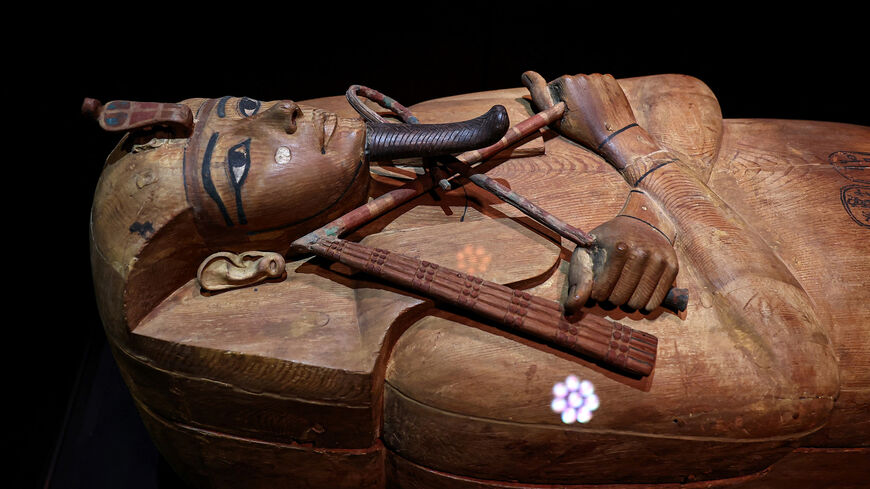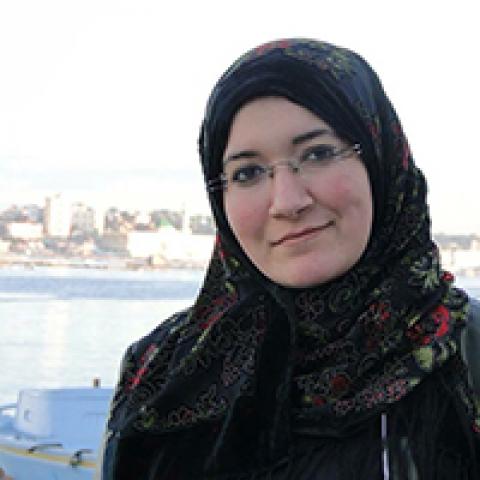CAIRO — A temporary exhibition titled “Ramses the Great, the Gold of the Pharaohs” is taking place in Paris from April 7 to Sept. 6, showcasing the sarcophagus of Ramses II, aka Ramses the Great, third king of the 19th Dynasty whose reign (1279-1213 B.C.) was the second-longest in Egyptian history.
The exhibition in Paris is part of its international tour and comes after having made two stops in the United States since November 2021. The Egyptian Ministry of Tourism and Antiquities is organizing this traveling exhibition to promote tourism to Egypt.
The Ramses II sarcophagus, however, was not displayed in Houston or San Francisco. Egypt offered to display it in Paris as a token of appreciation for the European country that treated the king’s mummy for a fungal infection in 1976.
When many Western and Israeli media covered the exhibition, they allegedly claimed that Ramses was the “Pharaoh of the Exodus,” a notion that is strongly rejected by Egyptian archaeologists.
Mostafa Waziry, secretary-general of the Supreme Council of Antiquities, said that there is no archaeological or historical evidence in Egyptian antiquities that indicates at all that King Ramses II is the Pharaoh of the Exodus, or even any other Egyptian king.
“Ramses II has no relation either near nor far with the figure who was in power during the Exodus,” Waziry told Al-Monitor. “The one who was in power in the time of Moses was probably from the Hyksos,” in reference to the foreign dynasty that ruled parts of Egypt between 1638 and 1530 B.C.
He stressed that the Exodus has no relation with any ancient Egyptian king.
According to the myth of Israelites, whose narrative is spread over four books of the Torah, the pharaoh who enslaved the Israelitis ordered the killing of all newborn male Hebrews. However, one boy escaped the slaughter after his mother placed him in a basket on the Nile. He was found and adopted by the pharaoh's daughter, who named him Moses, according to the myth.
⚰️ An exhibition in Paris is showcasing the wooden coffin of Ramses the Great, the superstar Egyptian Pharaoh pic.twitter.com/5p0QzrSDIY
— Reuters (@Reuters) April 3, 2023
Waziry said that ancient Egyptians never adopted the concepts of killing women or children. He referred to Maat, the ancient Egyptian concept of justice, truth, harmony, law, morality and order, which is regarded as the Egyptian cultural identity.
Egyptologist Mohamed Raafat Abbas spoke to Al-Monitor about the greatness and historial importance of Ramses II. “[The pharaoh] is the direct target of distortion, grudges and spreading poisons of hatred on the part of Egypt's historical enemies because he is considered, beyond any doubt, a true and eternal symbol of the ancient Egyptian civilization,” he said.
“There is no archaeological area in Egypt from the far north to the far south without antiquities bearing the name of Ramses II,” he noted.
According to Abbas, the pharaoh's great and immortal antiquities have crossed the borders of Egypt to Palestine, Lebanon, Syria and northern Sudan, where one can find many of his artifacts and the remains of temples that he had established throughout his vast empire, all of which speak of the greatness of his historical glories, especially in the field of war, which was the best expression of the imperial glory of Egypt during his rule.
Abbas said that Ramses II was the owner of the first peace treaty in the history of the ancient world. Thus, he added, the accusation that Ramses II was the Pharaoh of Exodus is based on Zionist propaganda that stands behind this matter in the international media.
Abbas mentioned the 2022 book titled “The Dawn of Israel: A History of Canaan in the Second Millennium BCE,” by Lester L. Grabbe, saying it is regarded as “evidence of the fall of those theories that believe in the connection between Ramses II and events of the Exodus of the Israeli people.”
Abbas quoted the writer as saying: “It is really strange that some historians or researchers believe that the events of the Exodus, or the Israeli invasion of Canaan, could have occurred during the reign of Ramses II.
“There is no doubt that the man was definitely one of the most powerful kings of his time, and one of the greatest kings of the ancient Near East at all, and historical evidence indicates that his strong influence extended over all regions of Canaan and Syria during a wide period of the 13th century BC.”
Grabbe continues: “One cannot imagine that those events associated with the Exodus narrative, such as the drowning of the king of Egypt in the waters of the Red Sea, in addition to Egypt's exposure to all these disasters, epidemics and disturbances described by the Torah before the events of the exodus and large population migration from its land, the defeat of a large army like its army near the Red Sea, that it may agree or be completely in line with the reign of a great and famous king such as King Ramses II."
Magdy Shaker, chief archaeologist at the Ministry of Tourism and Antiquities, told Al-Monitor that the best evidence refuting the claim that Ramses II was the Pharaoh of the Exodus is the mummy of the king himself.
“The mummy of King Ramses II was the first royal mummy to be examined with the latest scientific and medical equipment at the highest level in France in 1976 to treat the fungus that began to appear in the mummy,” he said.
According to the results following the examination, he noted, these studies showed a lot of information about the mummy's state of health before and after death.
“It proved that the king did not die by drowning or that he was exposed to an emergency event that took his life at this old age,” he said. “Logically with a bent back [due to old age], it may have been difficult for him to chase after Moses and his followers."
In addition to the sarcophagus, the exhibition in Paris includes about 180 artifacts from the Egyptian Museum in downtown Cairo dating back to the Ramses II era, and artifacts from the recent discoveries by the Egyptian mission of the Egyptian Ministry of Tourism.
The issue of connecting Ramses II with the Pharaoh of the Exodus has been tackled many years already.
In 2009, prominent Egyptologist Zahi Hawass wrote in an article published in Asharq Al-Awsat about the Exodus. “Perhaps one of the most discussed topics in ancient Egyptian antiquities is the issue of the Exodus of the Children of Israel from Egypt. Thousands of papers and articles have already been published about the history of the Exodus, the path that Moses, peace be upon him, and his people took to escape from the Pharaoh of Egypt, and the time period that this Exodus took place, and even discussions revolve around who is the Pharaoh of the Exodus,” he said.
He noted that during the Israeli occupation of the Sinai Peninsula between 1967 and 1982, Israel commissioned Jewish archaeological missions to carry out excavations there in search of any evidence of their presence and the Exodus.
“These missions did not discover any evidence indicating the Exodus,” he wrote, adding that one of the most active archaeological missions in Sinai during the occupation period was the mission of archaeologist Eliezer Oren, who published the work of his excavations and discoveries in Sinai. All of them, he continued, did not come out with any evidence indicating the Exodus of the people of Israel from Egypt.
On the contrary, he noted, Oren revealed a part of the famous Pharaonic road known as the Way of Horus, which is the road that the Egyptian armies took in various ancient times to establish security between the conflicting states in the ancient Near East in the regions of Palestine, Lebanon and Syria.







